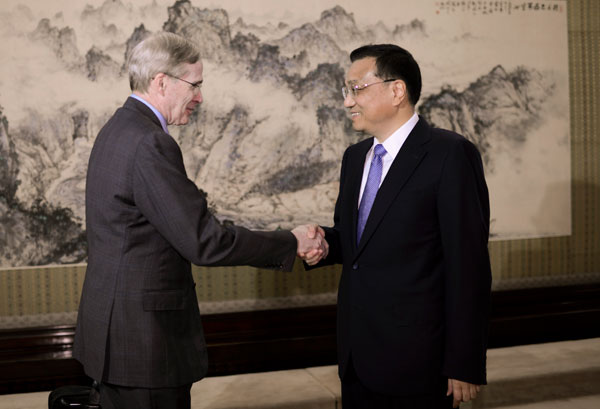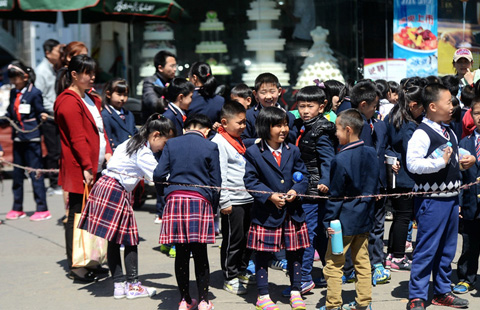Li vows to safeguard postwar order
By Zhang Yunbi (China Daily) Updated: 2012-10-24 07:22Achievements in Sino-US ties due to enhanced mutual trust
Vice-Premier Li Keqiang on Tuesday elaborated on China's solemn stance over the Diaoyu Islands row with Japan during a meeting with visiting former prominent politicians from the US.
Li made the remarks when meeting the officials, including former US national security adviser Stephen Hadley, amid the tension between China and Japan over the islands, which lie in the East China Sea and have belonged to China for centuries.
Japan illegally grabbed the islands at the end of the Sino-Japanese War in 1895. After World War II, the islands were returned to China in accordance with international protocol and documents signed at the Cairo Declaration and the Potsdam Proclamation.
Observers said Li's remarks made clear to Washington Beijing's unchanged commitment to its stance in the row in the context of the US presidential election, and it was also a warning to Tokyo to dispel any illusions it might have in the manner.
 |
|
Vice-Premier Li Keqiang on Tuesday meets visiting former US senior officials, including former US national security adviser Stephen Hadley in Beijing. Liao Pan / China News Service |
Li said the key to historical achievements in Sino-US ties in the past 40 years lies in boosted mutual trust, expanded consensus, enhanced bonds for common interests and "properly handled sensitive issues".
The visiting officials said both Democrats and Republicans support a robust development of US-China ties, and the visitors pledged to contribute to bilateral ties as well as regional stability and development.
Dong Manyuan, vice-president of the China Institute of International Studies, said Li's remarks shows Chinese top policymakers' consistency in policies regarding both China-US ties and the Diaoyu Islands row.
"The meeting informed the US of Beijing's policy blueprint, and it is sending signals to Washington that Beijing hopes it can play a constructive role in the Asia-Pacific region after Washington announced its plan to pivot to Asia," Dong said.
Media reports in the US and Japan have highlighted the veterans' trip as an effort by Washington to "mediate" the heated territorial row, yet Chinese Foreign Ministry on Monday rejected the so-called mediation role.
Sino-Japanese relations have soured since the Japanese government completed an illegal "purchase" of part of the islands in mid-September, a decision that led to protests from China.
The Japanese coast guard said four Chinese fishery administration vessels on Tuesday continued to patrol the waters off the Diaoyu Islands.
Meanwhile, Beijing on Tuesday warned other countries about interfering in the territorial row, in response to Panamanian President Ricardo Martinelli on Monday making remarks supporting Japan's stance in the Diaoyu Islands issue.
"Japan's attempt to drag third parties into the dispute never contributes to its so-called territorial stance, and makes no difference," Foreign Ministry spokesman Hong Lei told reporters in Beijing.
Hong also warned that Japan's illegal island "purchase" has led to the serious situation in bilateral ties, and has affected and violated development of bilateral ties in various fields, for which Japan should shoulder all the blame.
Hyped sailing
In wake of previous similar cases of false alarm, Japanese media on Tuesday created a new spin, speculating that Chinese navy vessels might head toward "Japanese territorial waters" in the southwest of Japan.
Three Chinese navy ships on Tuesday were spotted passing the international waters between Okinawa and Miyako.
Yet Japan's NHK Television claimed that "the ship, if keeping its direction unchanged and heading north, may enter Japan's territorial waters near Okinawa". Reports also said the Japanese Defense Ministry went on high alert and was closely watching the situation.
China's Ministry of National Defense told China Daily later in the day that the three Chinese vessels' routine training and sailing in the waters is "justified and legal".
"We expect the relevant parties to view it in a rational and reasonable way, and it is unnecessary to make much fuss," the ministry said.
The Tuesday media hype from Tokyo poured in just a week after Japanese broadcasters on Oct 16 played up seven Chinese navy vessels' passing through international waters close to an Okinawan island. The fleet was later confirmed on its way home after a regular training exercise in the Pacific.
zhangyunbi@chinadaily.com.cn
- Premier underlines peaceful settlement of boundary issues with India
- China plans to launch core module of space station
- Xi urges stronger PLA
- Charities rebuild image through relief efforts
- Self-testing to boost HIV battle
- Study finds plummeting levels of physical activity among Chinese adults
- School not at fault, its principal insists
- Xi says advice from netizens welcome
- China to help more rural migrants settle in cities
- Expert says big quake unlikely to hit nation soon








